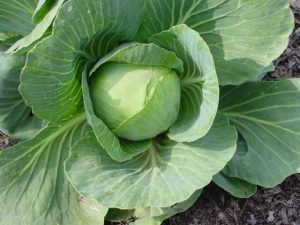By Heide Kennedy, Arizona Farm Bureau Communications Intern

Cabbage, grown quite well in Arizona, is the start of great sauerkraut.
We often hear or read about all the benefits of eating so-called “superfoods,” which are just foods that provide a huge punch of nutrients in a serving. Within all that talk about superfoods, you might have heard about fermented foods, which are a specific kind of superfood gaining a lot of popularity, as they are an amazing source of probiotics, which provide a whole slew of health benefits. Read on to learn more!
So, what exactly are fermented foods? Fermented foods are those that are made using certain bacteria or yeast to break down the sugars that they contain, thus making them “fermented.” Thanks to this process, fermented foods contain probiotics, which are living organisms that are great for our health. Probiotics displace the bad bacteria from our gut, support our immunity, and produce other by-products and metabolites that support our health in other ways. Some examples of fermented foods include sauerkraut, kefir, yogurt, kimchi, sourdough, miso, tempeh, and my personal favorite, kombucha.
A fun fact about kombucha is that besides providing our bodies with lots of probiotics, regular consumption of it has also been shown to be good for those with allergies and asthma! Researchers note that it doesn’t act as an antihistamine, but it does reduce reactivity to substances that cause allergy or asthma symptoms.
Fermented foods and the probiotics that they provide are so important. Here on Fill Your Plate, we’ve written a lot about them! Check out these related articles below!
- Fermented Foods for Your Gut Health – Fill Your Plate Blog
- Funky Fermented Foods – Fill Your Plate Blog
- Fermented Foods: Good or Gross? – Fill Your Plate Blog
- Are You Feeding Your Bacteria Enough? – Fill Your Plate Blog
- Yogurt will Add Probiotics to your Digestive System – Fill Your Plate Blog
- Add Yogurt to Your Diet to Improve Digestion – Fill Your Plate Blog

